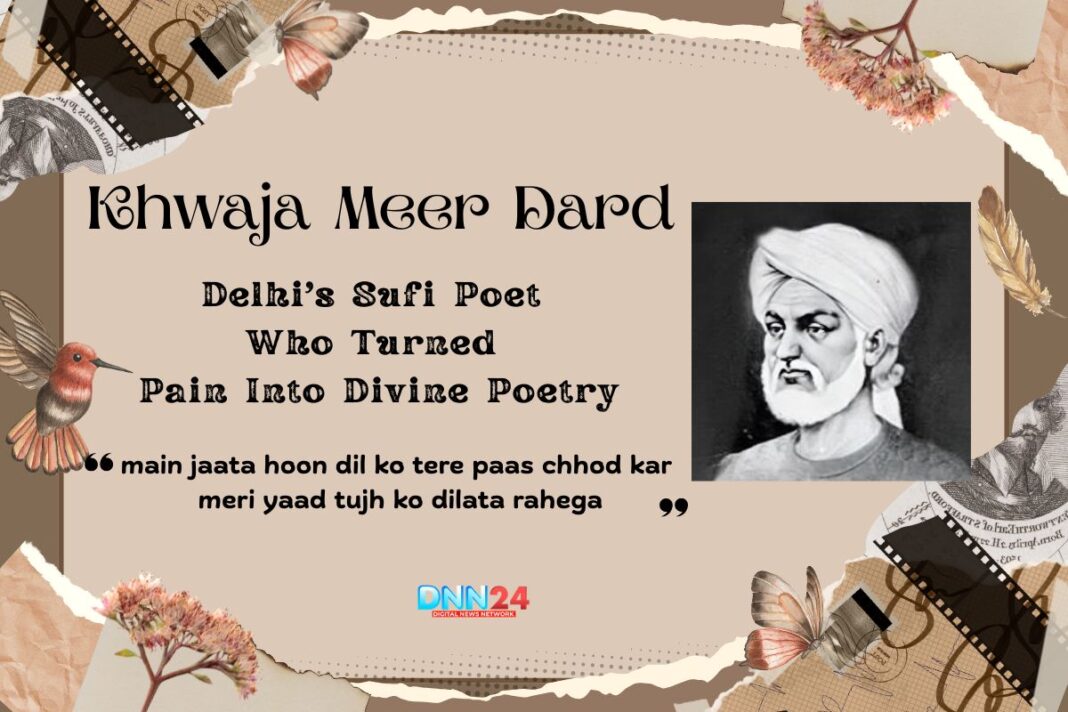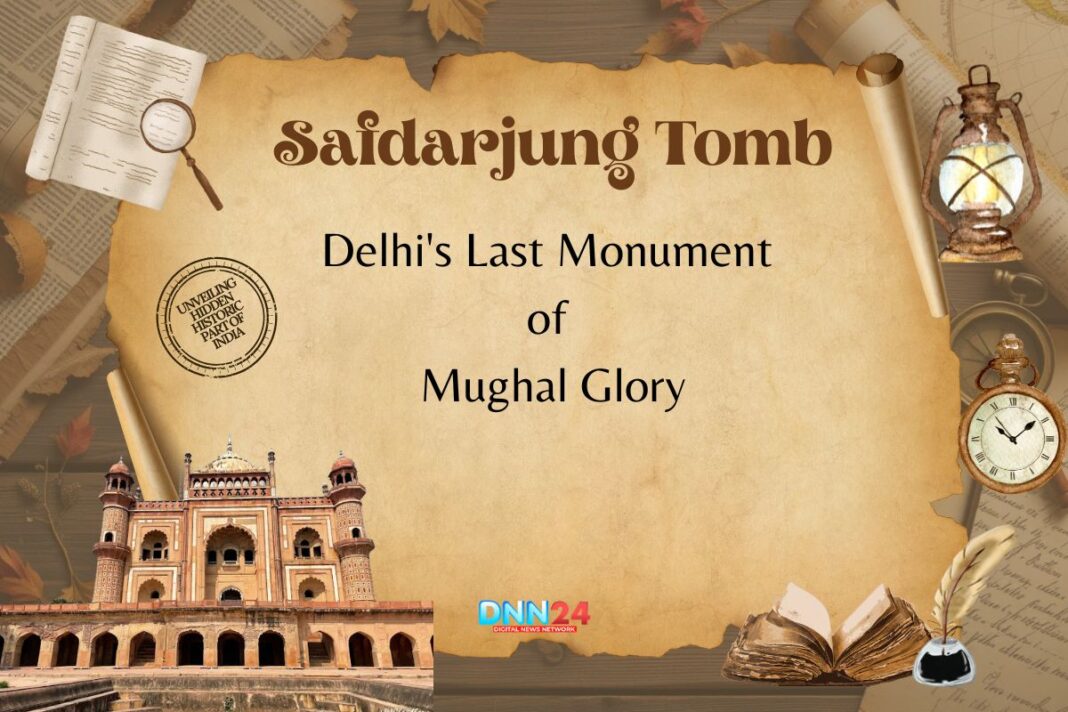Khwaja Meer Dard was born in Delhi in 1721 to a Syed family that had migrated from Bukhara. Delhi was then a city trembling under the shadow of invaders and political storms. Dard’s father, Khwaja Muhammad Nasir Andalib, once a royal officer, left luxury and power to embrace the humble path of Sufism. Young Dard grew up surrounded by stories of renunciation and spiritual longing, witnessing both the turmoil outside and the deep quiet within his home.
sair kar duniya ki ghafil zindagani phir kahan
Khwaja Meer Dard
zindagi gar kuchh rahi to ye jawani phir kahan
Life taught him the language of pain early, a language he later transformed into poetry. The Delhi of his childhood bustled with music and Qawwali nights, but its alleys echoed with stories of survival, hunger, and heartbreak as empires fell and rose. Dard learned not from grand institutions but in the whisper of verses exchanged among poets, in the laughter of street children, and in silent evenings when his father recited Persian couplets about divine love.
dard-e-dil ke waste paida kiya insaan ko
Khwaja Meer Dard
warna ta.at ke liye kuchh kam na the karr-o-bayan
It is said Dard was once found playing with the city’s poorest children beside dilapidated walls, moments he cherished later, writing that his shop contained nothing except pain, that his heart sold the rose of the scar of friendship. For him, Delhi was both cradle and cross, a place whose suffering became his spiritual inheritance.
tar-damani pe shaikh hamari na jayi.o
Khwaja Meer Dard
daman nichod den to farishte wazu karein
Hidden Stories of Struggle and Resilience
Dard’s life was marked by personal and societal turbulence. He witnessed invasions by Nadir Shah and Ahmed Shah Abdali, the devastation of Delhi, and the gnawing loss that swept through its streets. Unlike many poets who fled to seek fortunes in safer lands, Dard never abandoned his city even during its darkest hours. He tried, early on, to survive as a soldier but could not bear the violence and chaos of war.
zindagi hai ya koi toofan hai
Khwaja Meer Dard
ham to is jeene ke hathon mar chale
The disappointment of this failed career was not just professional but gnawed at his soul, pushing him closer to the mystical traditions of his father. He renounced worldly pleasures at the age of 28, committing himself to a life of piety, humility, and relentless inner searching. Dard’s struggles were of a silent kind. His family often lived without comfort, squeezed by crumbling buildings and oppressive summer heat; yet, he opened his home to music and poetic gatherings, using art as his salve.
nahin shikwa mujhe kuchh bewafai ka teri hargiz
Khwaja Meer Dard
gila tab ho agar tu ne kisi se bhi nibhai ho
In his writings, pain is not a wound but a ladder. It is the sorrow that moves hearts and the longing that kindles faith. When Delhi’s rivers ran dry, he wrote that Delhi, which has now been devastated, sees tears flowing now instead of its rivers. His poetry became Delhi’s voice, a witness to its suffering. One anecdote recalls how, after yet another raid on the city, Dard stood among the ruined homes and sang Sufi hymns to comfort the grieving widows, a poet not only of verses but also of deep empathy.
aziyyat musibat malamat balaen
Khwaja Meer Dard
tire ishq mein ham ne kya kya na dekha
Sufi Wisdom and Writings: Lessons in Light and Loss
Dard made his name as one of the pillars of the classical Urdu ghazal, alongside Mir Taqi Mir and Sauda. Yet what sets him apart is the Sufi soul beneath every couplet. His poetry stems from the mystical Naqshbandi order, where the phenomenal world is merely a veil concealing eternal reality. His writings are both gentle and profound, echoing his belief that life is exile from our true spiritual home.
hai ghalat gar guman mein kuchh hai
Khwaja Meer Dard
tujh siwa bhi jahan mein kuchh hai
Dard’s most famous spiritual treatises and poetic collections often dwell on the pain of separation and the hope of union with the divine. He strongly advocated wahdat-ul-wujood, the unity of existence, writing with a directness that shunned ornamentation, making his words accessible yet infinitely deep. His lines reflect the idea that humans were created for sorrow and empathy, suggesting that sorrow is not meant to break us, but to build a spiritual bridge to the divine.
jag mein aa kar idhar udhar dekha
Khwaja Meer Dard
tu hi aaya nazar jidhar dekha
He wrote the 1600-page Nala-ye Andalib as a symbolic journey, connecting the nightingale’s lament to the Prophet’s grace. Dard’s poetry became a refuge, a lantern for those wandering through loss and uncertainty. Stories say he would personally counsel distraught poets and musicians, instructing them that every tear was secretly worshipped, every heartbreak a step closer to God. His approach to spirituality was practical and deeply human, rooted in the everyday struggles of ordinary people rather than abstract philosophy.
mujhe ye dar hai dil-e-zinda tu na mar jaaye
Khwaja Meer Dard
ki zindagani ibarat hai tere jeene se
Lasting Legacy: Pain Transformed into Grace
What makes Khwaja Meer Dard unique is how he turned pain into power, despair into devotion, and loss into spiritual wisdom. Unlike poets who sought escape, Dard remained rooted like an old tree in Delhi’s swirling storms, teaching his students that love and longing are life’s ultimate teachers. His poetry and teachings continue to illuminate the hearts of those seeking meaning across generations, transcending religious and cultural barriers.
arz-o-sama kahan teri vus.at ko paa sake
Khwaja Meer Dard
mera hi dil hai vo ki jahan tu sama sake
Many legends reveal how, even in his final years, Dard would wander through his beloved city’s narrow lanes, quietly handing out food and reciting verses to labourers, his heart constantly beating for the marginalised and the poor. He imagined the world as a fleeting shadow, reminding us repeatedly to cherish every breath, every moment.
jaan se ho gaye badan khaali
Khwaja Meer Dard
jis taraf tu ne aankh bhar dekha
Today, the colony named after him stands as a living tribute not just to his poetry but to his spirit of endurance, hope, and selfless love. Khwaja Meer Dard’s story remains a guiding light not only for writers and Sufis but for anyone yearning to turn their unseen grief into the purest poetry of life. His work teaches that suffering need not destroy us, but can instead become the very soil from which our most extraordinary beauty grows; that in our darkest moments, we find our most authentic connection to something larger than ourselves.
un labon ne na ki masihaai
Khwaja Meer Dard
ham ne sau sau tarah se mar dekha
Also Read: Deep Narayan Nayak: Teacher of the Street Who Turned Walls into Blackboards
You can connect with DNN24 on Facebook, Twitter, and Instagram and subscribe to our YouTube channel.



